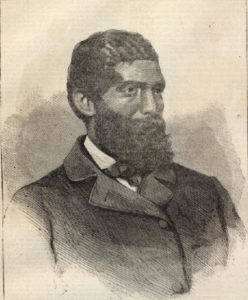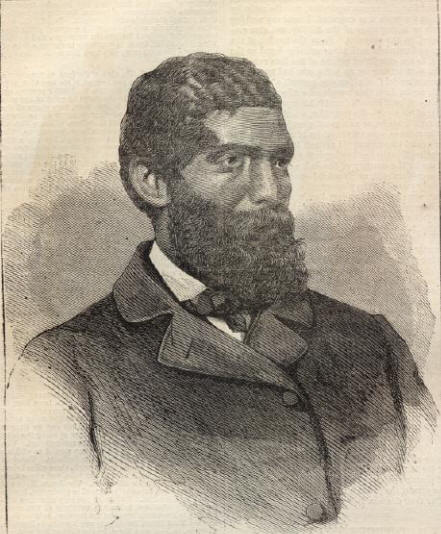
John Rock was an American teacher, doctor, dentist, lawyer and abolitionist. Rock was one of the first African-American men to earn a medical degree. In addition, he was the first black person to be admitted to the bar of the Supreme Court of the United States.
On January 23, 1863, John Rock made a speech at the annual meeting of The Massachusetts Anti-Slavery Society. What follows are excerpts from that speech published 2/14/1863 in “The Liberator,” the paper of the radical abolitionist William Lloyd Garrison.
Rock was a Yankee, born in Salem Massachusetts. He was certainly no friend of the South, but he does provide some insight to the differences between the North and the South regarding the black race.
First Rock points out that the “deep and cruel prejudice” against blacks in America is “much more abundant in the North.” He then explains why, and closes this passage of his speech stating that both rich and poor in the North hate blacks out of self-interest, and hold no notion of “justice and humanity:”
“I do not deny that there is a deep and cruel prejudice lurking in the bosoms of the white people of this country. It is much more abundant in the North than in the South. Here, it is found chiefly among the higher and lower classes; and there is no scarcity of it among the poor whites at the South. The cause of this prejudice may be seen at a glance. The educated and wealthy class despise the Negro, because they have robbed him of his hard earnings, or, at least, have got rich off the fruits of his labor; and believe if he gets his freedom, their fountain will be dried up, and they will be obliged to seek business in a new channel. Their “occupation will be gone.” The lowest class hate him because he is poor, as they are, and is a competitor with them for the same labor. The poor ignorant white man, who does not understand that the interest of the laboring classes is mutual, argues in this view: “here is so much labor to be performed, — that darky does it. If he was gone, I should have his place.” The rich and the poor are both prejudiced from interest, and not because they entertain vague notions of justice and humanity.”
Next, though he doesn’t call Lincoln by name, it is obvious he is chastising Lincoln and his cronies who “advocate emancipation as a military necessity.” The question then becomes “what is to be done with the slave, if he is set at liberty.” This question was echoed in other Northern newspapers of the day, “What shall we do with the negro?” Lincoln and most in the North had long planned on colonization. Rock fires back that this hypocrisy is why the North is frowned on in Europe. He points out the North takes “away the rights of those whose color differs from your own.” He indicts the Northern businessman who, if he cannot profit from the slave, “you will banish him!”
“Many of those who advocate emancipation as a military necessity seem puzzled to know what is best to be done with the slave, if he is set at liberty. Colonization in Africa, Haiti, Florida and South America are favorite theories with many well-informed persons. This is really interesting! No wonder Europe does not sympathize with you. You are the only people, claiming to be civilized, who take away the rights of those whose color differs from your own. If you find that you cannot rob the Negro of his labor and of himself, you will banish him! What a sublime idea! You are certainly a great people! What is your plea! Why, that the slaveholders will not permit us to live among them as freemen, and that the air of Northern latitudes is not good for us!”
To the claim that blacks must be colonized because Southerners will not live with them Rock responds that Southerners are not the enemy of the black people and do not desire to see them removed. He even asserts. “there is no prejudice” in the South where Southerners will favor blacks over whites:
“Let me tell you, my friends, the slaveholders are not the men we dread! They do not desire to have us removed. The Northern pro-slavery men have done the free people of color ten-fold more injury than the southern slaveholders… There is no prejudice against color among the slaveholders. Their social system and one million of mulattos are facts which no argument can demolish. If the slaves were emancipated, they would remain where they are. Black labor in the South is at a premium. The free man of color there has always had the preference over the white laborers. Many of you are aware that Southerners will do a favor for a free colored man, when they will not do it for a white man in the same condition in life.”
Rock next asks incredulously, “Why is it that the free people from all other countries are invited to come here, and we are asked to go away?” He then continues in a heartbreaking and credible point of how the black man has earned a right to be here just as much as the white. And then answers why the North wants him gone, stating yet another indictment of the kind of abstract anti-slavery motive we see in Lincoln. For so many in the North the motive was not a humanitarian concern for the well being of the slave. The concern was how America would look to the eyes of the world when proclaiming the right to “liberty” while keeping the black enslaved. Lincoln hated the idea of living with blacks, and his anti-slavery was driven by this racist attitude coupled with the abstract notion of slavery as a violation of liberty that stained America’s reputation. The problem then was what to do with blacks once freed? The answer for Lincoln up until the week he died was colonization. Rock then concludes this part of his speech by refuting the other Anti-slavery solution. There were Northern voices like Ralph Waldo Emerson who believed if cut off from the welfare of the master the black man would eventually “die out” unable to compete in white society. Rock refutes this claim, saying that in spite of great hardships, free blacks are surviving:
“Other countries are held out as homes for us. Why is this? Why is it that the people from all other countries are invited to come here, and we are asked to go away? Is it to make room for the refuse population of Europe? Or why is it that the white people of this country desire to get rid of us? Does anyone pretend to deny that this is our country? Or that much of the wealth and prosperity found here is the result of the labor of our hands? Or that our blood and bones have not crimsoned and whitened every battlefield from Maine to Louisiana? Why this desire to get rid of us? Can it be possible that because the nation has robbed us for nearly two and a half centuries, and finding that she can do it no longer and preserve her character among nations, now, out of hatred, wishes to banish, because she cannot continue to rob us? Or why is it? Be patient, and I will tell you. The free people of color have succeeded, in spite of every effort to crush them, and we are today a living refutation of that shameless assertion that we ‘can’t take care of ourselves,’ in a state of freedom.”
Rock points out the hypocrisy of the North in that blacks are acceptable as slaves, but set them free and Northerners want nothing to do with them but colonization:
“The black man is a good fellow while he is a slave and toils for nothing, but the moment he claims his own flesh and blood and bones, he is a most obnoxious creature, and there is a proposition to get rid of him! He is happy while he remains a poor, degraded, ignorant slave, without even the right to his own offspring. While in this condition, the master can ride in the same carriage, sleep in the same bed, and nurse from the same bosom. But give the same slave the right to use his own legs, his hands, his body and his mind, and this happy and desirable creature is instantly transformed into a miserable and loathsome wretch, fit only to be colonized somewhere near the mountains of the moon, or eternally banished from the presence of all civilized beings. You must not lose sight of the fact that it is the emancipated slaves and the free colored man whom it is proposed to remove — not the slave: This country and climate are perfectly adapted to Negro slavery; it is the free black that the air is not good for! What an idea!”
In a final quote Rock explains why he opposes colonization:
“It is true, a great many simpleminded people have been induced to go to Liberia and to Haiti, but, be assured, the more intelligent portion of the colored people will remain here; not because we prefer being oppressed here to being free men in other countries, but we will remain because we believe our future prospects are better here than elsewhere, and because our experience has proved that the greater portion of those who have left this country during the last thirty years have made their condition worse, and would have gladly returned if they could…”
John Rock is just one of many primary sources that reveals the hypocrisy of Northern “antislavery,” in comparison to the benevolent attitude Southerner whites held toward their black neighbors.







I always enjoy the light that gets shed on the glorious South when put in context with the statements of those who lived in the 1800s. There are so many who are ignorant because they do not look to the words spoken during this time, including the words of those who rightly opposed slavery.
I cannot, for the life of me, find this original speech. I looked at The Liberator archives and could not find Mr. Rock’s speech. Could someone respond with a link? I managed to find an earlier version of this speech it seems, but it lacks the same punch.
The issue you are looking for is The Liberator vol. XXXII, no. 7, Feb. 14, 1862. The source I was able to find very useful is http://fair-use.org/the-liberator/1862/02/14/the-liberator-32-07.pdf. The hang up I noticed also spending many days searching for the full speech was the year. 1862 not 1863, a minor and easy enough typo to make but boy does it make tough to find.
You’ll have to zoom in on the article since the file is an upload of the whole paper. The full speech is lengthy but a good read. Another John Rock speech with a similar tone is found in The Liberator vol. XXX, no. 5, Feb. 3, 1860, through the same web source, fair-use.org.
Hope this helps.
Rodd Obarr doesnt cite his evidence because he made it up.